Celebrating World Health Day with Binaytara: Reducing Women’s and Children’s Cancer Disparities
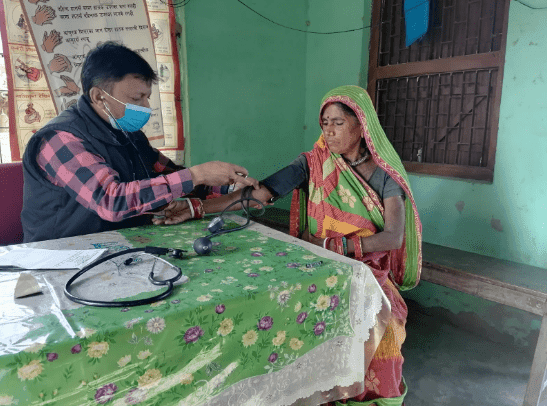
Introduction
World Health Day is celebrated each year on April 7 to mark the founding of the World Health Organization (WHO) in 1948. Each year’s theme highlights a pressing global issue, and this year’s campaign, Healthy Beginnings, Hopeful Futures, focuses on maternal and newborn health. This campaign urges governments and health institutions to step up efforts to eliminate preventable maternal and newborn deaths, emphasizing the long-term importance of prioritizing women’s health and wellness.
Binaytara’s Mission in Action: Advancing the Goals of World Health Day
As World Health Day approaches, Dr. Binay Shah, the president and co-founder of Binaytara, shared some reflections to commemorate this important day.
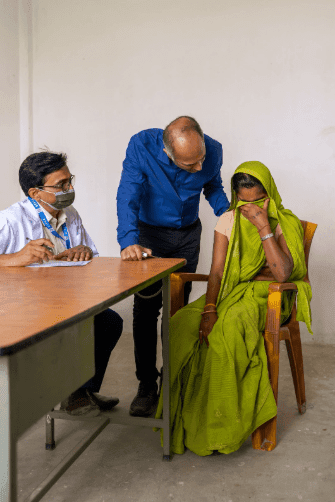
Dr. Shah comforting a patient at the Binaytara health camp in 2023
At Binaytara, our team is fully committed to initiatives that transform how healthcare is delivered and enhance overall community health. For instance, we have been conducting awareness campaigns and cancer screening programs. Recently, we organized a major health camp in Nepal, where we provided care to over 240 patients. We conducted breast and cervical cancer screenings, examined numerous individuals, and identified suspicious findings in several cases. Not only did we have the opportunity to educate patients, but we also detected early-stage cancers, offering patients a better chance at curative treatment.”
The Urgent Need for Health Equity: World Health Day’s Key Message
A key message of World Health Day is the urgency of ending preventable deaths. The WHO is specifically advocating for global action to ensure women and babies in the world’s poorest countries—where infrastructure is often inadequate—have access to high-quality care. This mission aligns closely with the work we are doing at Binaytara through the C.A.R.E. model: Cancer care center expansion, Advocacy for better healthcare access and outcomes, Research in implementation science, and Education for continuous medical professional development.
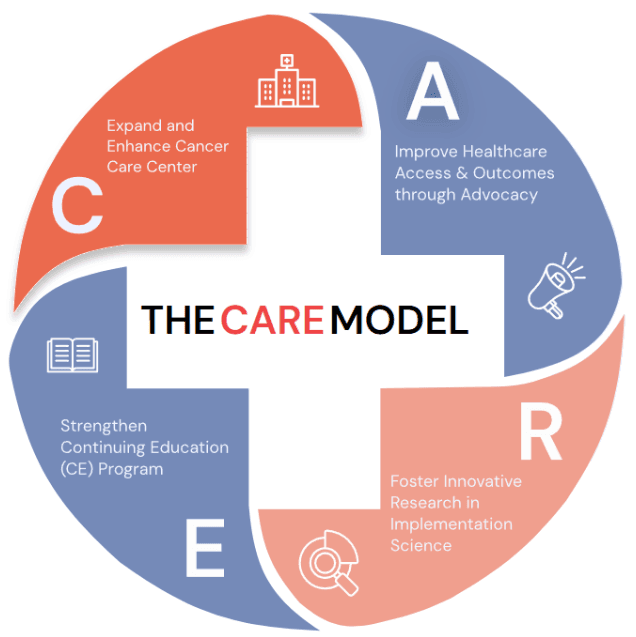
The Binaytara CARE MODEL for minimizing cancer disparities
Education and healthcare access play a crucial role in reducing preventable deaths, particularly in cancer care. At the heart of disease prevention—including cancer—is the persistent issue of health disparities. Our flagship conference, the Summit on Cancer Health Disparities (SCHD25), is tackling this challenge head-on, using education as a powerful tool to drive change.
SCHD25: Where Interdisciplinary Experts Meet to Advance Cancer Care and Equity
SCHD25 is a premier annual event organized by Binaytara to fuel its mission of minimizing cancer disparities. It is one of the few conferences in the United States that focuses on tackling disparities in cancer care. The conference will cover issues at the forefront of cancer care, including a deep dive into implementation science, community outreach and engagement, and artificial intelligence. Registered attendees will meet from April 25 to April 27, 2025, at the Bell Harbor International Conference Center in Seattle, Washington. They will participate in various sessions designed to fuel active learning, including lectures, panel discussions, debates, and case-based discussions. The conference also includes breakout sessions that address niche topics that will foster close-knit discussions between experts.
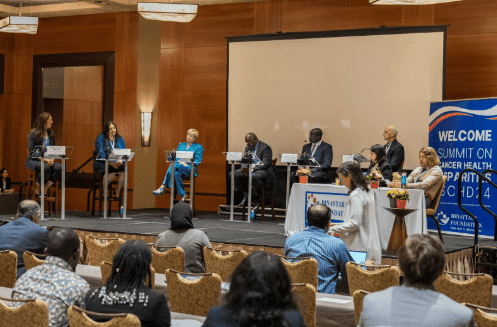
A debate session at SCHD24
This conference was created to address health disparities and access to cancer care that occurs both locally and globally. Topics that affect women’s health, such as ‘Discrimination’s Impact on Health-Related Quality of Life’ and ‘Addressing Breast Cancer Equity Through Virtual Community Oncology Navigation and Engagement’ will be discussed in detail. Addressing cancer disparities, particularly among women, reflects the campaign goals of World Health Day by emphasizing the need for equitable access to prevention, early detection, and treatment, which are critical to reducing inequities rooted in social determinants of health. We are also championing this effort from conference halls to the community.
How the Binaytara Health Camp in Nepal is Bringing Care to Underserved Communities
On March 23rd, 2025, Binaytara held a day-long health camp in Janakpur, Nepal, providing vital medical services and cancer care to more than 240 people in an underserved community. The health camp offered free medical services, including screenings, preventive care, and essential physical examinations, improving access to affordable healthcare. Common medical conditions identified at the health camp included infectious diseases, cardiovascular and respiratory conditions, gastrointestinal issues, and musculoskeletal or joint problems. Complaints such as persistent cough, fatigue, headaches, and back or limb pain were frequently reported. Patients requiring further consultations were referred to the Binaytara Cancer Center or other relevant specialists for further diagnosis and treatment.
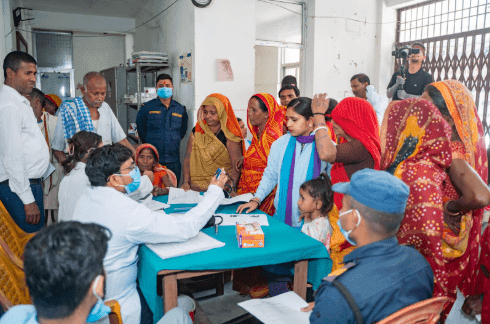
Binaytara Health Camp 2025
Many of the cases seen were preventable. However, due to barriers to quality care and low literacy rates, health concerns were left untreated. This was not until care was brought to the rural community. Patients as young as 2 and as old as 84 were seen during the health camp visit. Of the 244 patients treated, over 60% were women, with one check-up leading to the early detection of possible breast cancer. After a thorough examination by doctors, she was advised to undergo a mammogram. Doctors also educated women on the importance of early detection and demonstrated how to perform a breast self-exam.
Overall, this health camp, conducted in partnership with Engage Nepal, brought care to remote areas and significantly impacted the lives of women who might not have had access to optimal healthcare. Beyond this annual health event, which began in 2022, Binaytara is actively working to advocate for and prevent one of the most silent yet preventable causes of death that disproportionately affects women—cervical cancer.
Binaytara’s Center for Women’s Cancer Access and Advocacy: Supporting World Health Day 2025’s Gender-Equitable Healthcare
This year, World Health Day calls for action, urging effective investments in women's and children’s health. The ripple effect of investing in women’s health extends beyond one person. It uplifts families, strengthens communities, and saves lives. Yet, across the world, women continue to face barriers in cancer care, struggling to access timely screenings, life-saving treatments, and essential support. As such, Binaytara has implemented a comprehensive approach to enhance women’s cancer care access, focusing on cervical cancer screening, chemotherapy services, advocacy, and the establishment of a women’s cancer center. For many women and children, access to cancer care is a matter of survival.
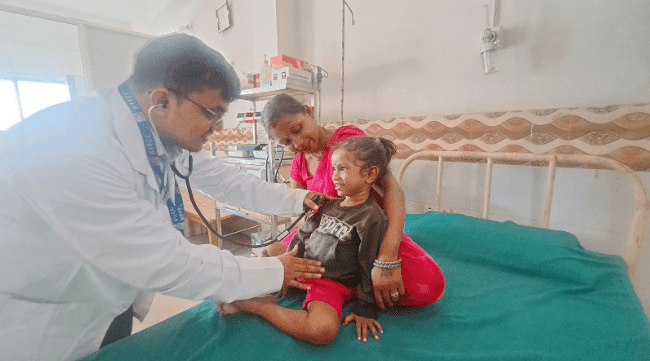
Aarav receiving treatment for Wilms tumor at Binaytara Cancer Center
Take the story of Manjula and her children. Her oldest child, Shivani, after being misdiagnosed by local doctors, was eventually diagnosed with late-stage Wilms' Tumor, a rare kidney cancer that mainly affects children. Despite their best efforts, Shivani passed away. Tragically, in a very rare case of Wilms tumor, Manjula’s two younger children, her son Aarav and her daughter Shristi, soon started displaying similar symptoms to their older sister and were also diagnosed with the same cancer.
This time, Manjula was referred to Binaytara Cancer Center from the children’s hospital in Kathmandu. Our local hospital team and our international tumor board reviewed the cases of Shristi and Aarav. We covered the cost of their treatment to ease the financial burden, provided chemotherapy rounds, and then recommended surgery for Shristi. Tragically, even after rounds of chemotherapy, no surgeon could perform surgery, and Shristi passed away earlier this year. On the other hand, Aarav responded better to the chemotherapy and is doing better. This tragedy underlies the critical need for increased awareness about early cancer detection and better access to comprehensive cancer care.
To expand our reach and impact of our global oncology programs, we are constructing a 200-bed comprehensive cancer hospital and research center and recruiting a comprehensive team of cancer care experts to provide access to the 25 million people in southern Nepal and the Indian State of Bihar who live near the new hospital site. It is estimated that the completion of this state-of-the-art facility will impact 20,000 patients annually. Because of this, supporting organizations like Binaytara that provide critical cancer services for women and children is a tangible way to drive change and ensure no woman faces cancer alone.
How to Participate in the World Health Day Campaign
World Health Day calls for enhancing access to care for women, investing in their well-being, and advocating for the rights of women and girls worldwide. Health equity is vital to achieving this goal and serves as a cornerstone of what Binaytara represents.
To foster dialogue on critical healthcare challenges worldwide, our new Global Health Lecture Series offers a platform for experts to explore innovative solutions and share insights on pressing global oncology and health issues. Titled ‘Perspectives in Global Health – Exploring Challenges and Solutions’, the series emphasizes health equity, healthcare infrastructure, policy advancements, and medical technologies to provide actionable solutions. For example, in January 2025, Dr. Raquel Sanchez spoke at our Perspectives in Global Health, highlighting the need for collaboration between public and private entities to drive change in global oncology.
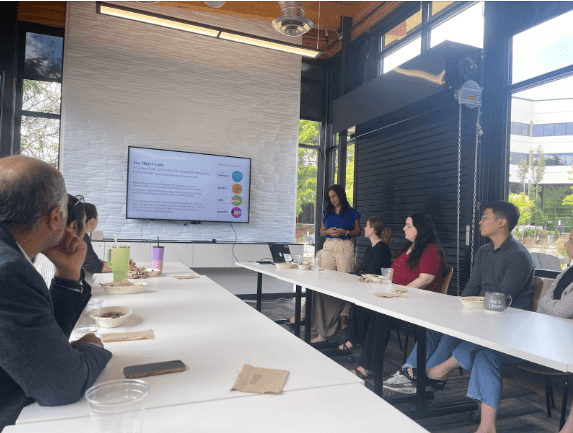
Dr. Raquel Sanchez presenting to Binaytara Staff
Bridging the healthcare gap for women requires collective action—involving policymakers, healthcare providers, caregivers, and the general public. Policymakers can help prevent unnecessary deaths by making high-impact investments, enacting family-friendly policies, and championing women's access to education.
But change does not rest solely in their hands. The general public plays a vital role in raising awareness, participating in global initiatives, and supporting organizations dedicated to providing quality care for women and babies worldwide. It takes all of us to close the gap in healthcare for women. For more information on how to participate, visit the World Health Organization’s page.
Conclusion
Healthy beginnings mark the start of something new and positive, sparking hope that can birth a brighter future. This year’s World Health Day aligns perfectly with our global oncology programs that bring hope and healing to patients and their loved ones, regardless of who they are or where they live.
Healthcare disparities have a profound impact on patient outcomes. No one should be denied life-saving care because of their gender, socioeconomic status, or ZIP code. Yet these factors too often dictate access to prevention, early detection, and treatment. That is why we are committed to bridging this gap through global oncology programs in Nepal and our continuing medical education programs in regional and rural communities in the US, bringing together experts to share the latest advancements in hematologic and solid cancers.
One such opportunity is SCHD25, our flagship conference, where learning meets action. Join us for an electrifying event that goes beyond discussion. “It is innovative and unlike any other conference”, as one of the organizing committee members, Emma Robinson, stated. SCHD25 hones in on implementing real-world solutions to reduce cancer disparities and improve health outcomes.
This World Health Day, let us unite to build a healthier, more hopeful future for women and children everywhere.